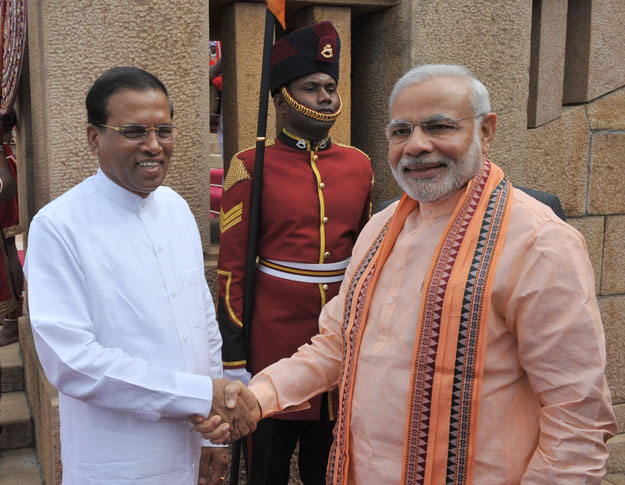
Tamils should be able to live "a life of equality, justice, peace and dignity in a united Sri Lanka," Modi said in Colombo after holding talks with new President Maithripala Sirisena.
He called for the "early and full implementation" of a 1987 constitutional provision that envisaged political autonomy for the Tamils, who are concentrated in the island's north.
Sirisena has promised to work on reconciliation between them and the Sinhalese majority after ousting former president Mahinda Rajapakse, who oversaw the brutal military suppression of a Tamil separatist rebellion in 2009.
Rajapakse won praise for ending the 37-year civil war that had ravaged the island and killed at least 100,000 people, mostly Tamils, but has also faced accusations of overseeing widespread rights abuses.
Modi, who will on Saturday become the first Indian prime minister to visit the northern Tamil stronghold of Jaffna, also pledged further economic cooperation with Sri Lanka after years of growing dependence on China.
Read: Modi to ramp up help for Indian Ocean nations to counter China influence
He said India would help develop a regional petroleum hub in the north-eastern port city of Trincomalee, and offered a $318 million credit line to improve Sri Lanka's railways.
Colombo became highly dependent on Beijing for infrastructure financing under Rajapakse.
Since his loss to Sirisena in a January election, the pendulum has swung back towards India with the new president making attempts to renegotiate the terms of some loans.
Modi, who is on a three-nation tour of Indian Ocean islands did not refer directly to China's growing influence in the region.
But he said he and Sirisena had agreed to set up a task force to focus on an "ocean economy" that could have strategic interests for both.
"This is how it should be between neighbours. We should meet regularly," said Modi, who is in Sri Lanka just weeks after Sirisena made India his first foreign port of call since his election in January.
"It helps us to understand each other better."
Modi, who will address the Sri Lankan parliament later Friday, is the first Indian prime minister to visit the island since Rajiv Gandhi in 1987, and is seeking to reassert New Delhi's influence in its backyard.
Sri Lanka's Tamils share close cultural and religious ties with those across the Palk Strait in the Indian state of Tamil Nadu, and New Delhi was closely involved in the civil war.
Sirisena said after their meeting he wanted to "turn a new page in our relations".
"It is a great honour for me and my country that you visited us," he said.
When Gandhi visited in 1987, he was famously assaulted with a rifle butt by a Sri Lankan naval rating while inspecting a guard of honour.
Modi was also accorded a guard of honour in Colombo -- although authorities have since ensured dignitaries inspecting the troops do not get within striking distance.
Gandhi had gone to Colombo to sign a pact that sought to end a guerrilla war by Tamil separatist rebels who had effectively enjoyed a safe haven in India since the mid 1980s.
The main rebel group, the Tamil Tigers, repudiated the peace accord that set up the Tamil devolution plan and India ended up fighting the militants they had once trained and armed.
Around 1,140 Indian soldiers lost their lives during the 32-month deployment in Sri Lanka and Gandhi himself was assassinated in 1991 by a female Tiger suicide bomber while campaigning in Tamil Nadu.
After the war ended in 2009, relations remained strained and Sirisena's predecessor Rajapakse caused unease in New Delhi by forging close ties with Beijing.
India, which traditionally regarded Sri Lanka as within its sphere of influence, was furious last year when Rajapakse allowed two Chinese submarines to dock in Colombo.
Sri Lanka's new rulers last month also ordered a suspension of China's biggest investment project, a $1.4 billion new city on reclaimed land just next to Colombo's main sea port.










1732354127-0/Untitled-design-(3)1732354127-0-270x192.webp)






COMMENTS (7)
Comments are moderated and generally will be posted if they are on-topic and not abusive.
For more information, please see our Comments FAQ